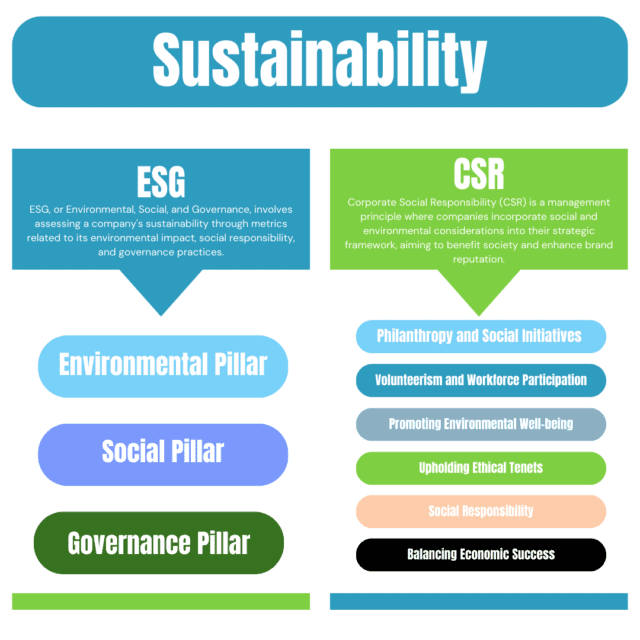In the contemporary world of business, the notions of Environmental, Social, and Governance (ESG); and Corporate Social Responsibility (CSR) have become intertwined. These two interconnected yet nuanced concepts are crucial for comprehending how companies and enterprises address sustainability and societal welfare. Despite a shared scope and sphere, subtle but notable disparities exist between the two frameworks.
Dual pathways…
ESG – Environmental, Social, and Governance – entails assessing a company’s sustainability stamp through the clearly defined metrics of environmental impact, social responsibility, and governance practices. It aims to determine the company’s sustainability and resilience along these lines, thereby holding it accountable to expressed commitments. ESG provides a quantifiable measurement of sustainability, which is increasingly used as a guide by investors and other stakeholders. It measures a company’s sustainability level and offers a practical, thorough perspective on this matter. ESG signifies the measurable outcome of a company’s overall sustainability performance. In recent years, ESG has gained immense interest from investors and corporate stakeholders, being recognized as a dominant trend of the decade.
In contrast, Corporate Social Responsibility (CSR) is a management principle whereby companies mainstream social and environmental considerations into their external engagement framework, aiming to benefit society and enhance brand reputation. Originating in the 1970s, CSR gained prominence and became pivotal for businesses of all sizes by the early 2000s. It embodies a company’s voluntary initiatives addressing social and environmental challenges beyond legal/regulatory obligations. CSR encompasses a broad spectrum of actions, from philanthropy to community engagement and even sustainable business practices. This concept has evolved over decades, adapting to shifting societal expectations placed on businesses.
A dive into ESG
Arising from the definition above, it is surmised that the ESG positioning of a company significantly influences investment decisions and helps to measure financial well-being. Businesses that genuinely incorporate ESG into their practices can gain investor confidence, access new markets, allocate resources effectively and efficiently, attract and retain high-quality employees, and enhance asset distribution, among other benefits. As the name suggests, ESG can be deconstructed into three core pillars as seen below.
Environmental Pillar: Central to the environmental facet of ESG is the company’s influence on the natural world. Companies attuned to ESG considerations evaluate their carbon emissions, energy efficiency, waste handling and disposal (including end of product), and commitment to responsible resource consumption. Through minimizing environmental hazards and embracing ecologically responsible approaches, companies and enterprises must strive to play a role in advancing environmental sustainability. This pillar pertains to a company’s ecological influence, encompassing concerns such as CO2 discharges, overall carbon impact, water utilization, contamination, and methods for waste control.
Social Pillar: The social aspect of ESG focuses on a company’s relationships with its stakeholders, including employees, customers, suppliers, and communities. It encompasses efforts to promote diversity and inclusion, ensure employee welfare, protect human rights, and engage with local communities. By fostering strong social bonds, companies aim to have a positive impact on various stakeholders. This dimension evaluates workplace diversity, employee safety, responsible supply chain practices, community involvement, and broader societal effects, highlighting the significance of ethical and responsible social interactions within and beyond the organization.
Governance Pillar: The governance aspect of ESG focuses on a company’s internal mechanisms that guide decision-making and corporate conduct. It encompasses transparent leadership, ethical conduct, board accountability, and shareholder rights, all of which contribute to building trust, safeguarding integrity, reducing corruption, and fostering sustainable success. This pillar involves examining a company’s internal policies for risk management, ethics, board structure, shareholder rights, and more. Governance within ESG pertains to the systems, processes, and structures that shape a company’s operations, influencing its behaviour and impact on stakeholders. It covers aspects such as corporate governance, decision-making processes, ethics, stakeholder engagement, risk management, and transparent reporting, all of which are crucial for promoting responsible and sustainable business practices.
A dive into CSR
As indicated earlier Corporate Social Responsibility (CSR) is a business strategy where companies express ethical and sustainable practices in their operations and decisions. CSR goes beyond legal obligations to confer voluntary benefits on society, especially the host communities. The framework helps companies to be, on their own terms, socially accountable to themselves, their stakeholders, and the public they serve. It is expressed through initiatives like philanthropy, community engagement, environmental care, and actions to create positive social change in impacted communities. The core aim of CSR is to improve a company’s reputation.

It’s about complementarity…
In summary, ESG and CSR are not opposing concepts but complementary strategies. When ESG principles are seamlessly integrated into a company’s core operations, they reinforce purpose-driven CSR initiatives, fostering a holistic commitment to responsible business practices. As the global demand for sustainability intensifies, businesses stand at a pivotal juncture. ESG and CSR offer distinct paths, both contributing to a company’s dedication to ethical conduct and societal impact. By understanding their distinctions, businesses can forge a path where profitability harmonizes with purpose, leaving a meaningful imprint on both society and the environment. In essence, ESG and CSR coalesce as powerful allies, driving authentic sustainability in an interconnected world.
Found it interesting and would like more in the mail?




